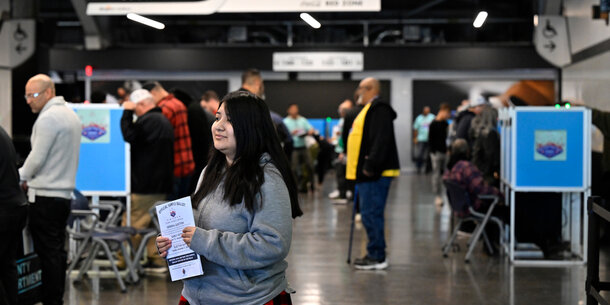Click here for the most recent Voting Laws Roundup.
With the 2022 regular legislative sessions starting in all but 15 states as of January 14, state lawmakers are already considering hundreds of bills aimed at voter access and the electoral process.footnote1_RlgVDr4yS6I8NpwgLxn0AsMgm1ResG6SVINZoAxK4cE_oRSBrjzQZ97Q1 Legislative sessions in Alaska, Connecticut, Hawaii, Louisiana, Minnesota, New Mexico, North Carolina, Oklahoma, Oregon, Utah, and Wisconsin were scheduled to begin after January 14, 2022. Montana, Nevada, North Dakota, and Texas do not hold regular session in even-numbered years.
The efforts to restrict voting have continued into this year. As of January 14, legislators in at least 27 states have introduced, pre-filed, or carried over 250 bills with restrictive provisions, compared to 75 such bills in 24 states on January 14, 2021.footnote2_4Hs5P4mvAOKyz7mbPvSHnFBPvF5rmb0yRpjenY7fTI_yVmx6lQl4ZMI2 Note that the Brennan Center released a January 2021 roundup that was updated as of January 26, 2021: https://www.brennancenter.org/our-work/research-reports/voting-laws-roundup-january-2021. These figures include carryover bills, which are far more common this year (an even-numbered legislative year) than last (an odd-numbered year). When carryover bills are set aside to focus on new legislative activity — the pre-filed and introduced bills — the increase in restrictive bills is still stark: 96 bills would make it harder to vote in 12 states as of January 14, 2022, compared to 69 such bills in 23 states, a 39 percent increase.
In keeping with restrictive voting laws passed last year, state legislators have resumed the assault with legislation that, if enacted, would disproportionately impact voters of color.
Many state legislators, however, remain committed to expanding access to the ballot box. As of January 14, legislators in at least 32 states have introduced, pre-filed, or carried over 399 bills that expand voting access, compared to 286 such bills in 30 states on January 14, 2021.footnote3_62cH2WWlJYezt9874zJmHYaLFnXCtkq4ELfxvyKKQ_bcR0UE3rxEGf3 Id.
Of the 33 state legislatures that are considering voting legislation as of January 14, 26 are considering both restrictive and expansive voting bills, and only one (South Carolina) is considering only restrictive voting legislation. Alabama, Florida, Maine, Rhode Island, South Dakota, and Vermont are currently only considering expansive voting bills.
This year, in addition to tracking bills that restrict or expand access to voting, we are tracking legislation that would undermine the integrity of the electoral process and empower partisans to manipulate election administration or outcomes. The unprecedented uptick of such bills that began last year has continued in 2022.
Like many of the bills restricting voting access, these bills are justified by the myth of widespread voter fraud and a stolen election. As of January 14, legislators in at least 13 states have pre-filed and introduced 41 bills that would undermine the electoral process.footnote4_6UzXamHFHLvf13Lljd5rFCrmEH00eJrjbzBjjiFMtM_mvejPVIRAEdY4 Carryover bills are not included in our tracking of election sabotage bills. These bills threaten the people and processes that make elections work. This legislation ranges from allowing any citizen to initiate or conduct new biased election audits; to imposing new criminal or civil penalties on election officials for making unintended errors; to allowing partisan actors to remove election officials from office. With these bills, state lawmakers are doubling down on efforts to undermine voters’ trust in elections. This legislation would open the door to manipulating election results for partisan reasons over accuracy.
As states approach the 2022 primaries and midterm elections, it is imperative that voting rights and the security of our elections remain a top priority on the state and federal levels.
End Notes
-
footnote1_RlgVDr4yS6I8NpwgLxn0AsMgm1ResG6SVINZoAxK4cE_oRSBrjzQZ97Q
1
Legislative sessions in Alaska, Connecticut, Hawaii, Louisiana, Minnesota, New Mexico, North Carolina, Oklahoma, Oregon, Utah, and Wisconsin were scheduled to begin after January 14, 2022. Montana, Nevada, North Dakota, and Texas do not hold regular session in even-numbered years. -
footnote2_4Hs5P4mvAOKyz7mbPvSHnFBPvF5rmb0yRpjenY7fTI_yVmx6lQl4ZMI
2
Note that the Brennan Center released a January 2021 roundup that was updated as of January 26, 2021: https://www.brennancenter.org/our-work/research-reports/voting-laws-roundup-january-2021. -
footnote3_62cH2WWlJYezt9874zJmHYaLFnXCtkq4ELfxvyKKQ_bcR0UE3rxEGf
3
Id. -
footnote4_6UzXamHFHLvf13Lljd5rFCrmEH00eJrjbzBjjiFMtM_mvejPVIRAEdY
4
Carryover bills are not included in our tracking of election sabotage bills.





